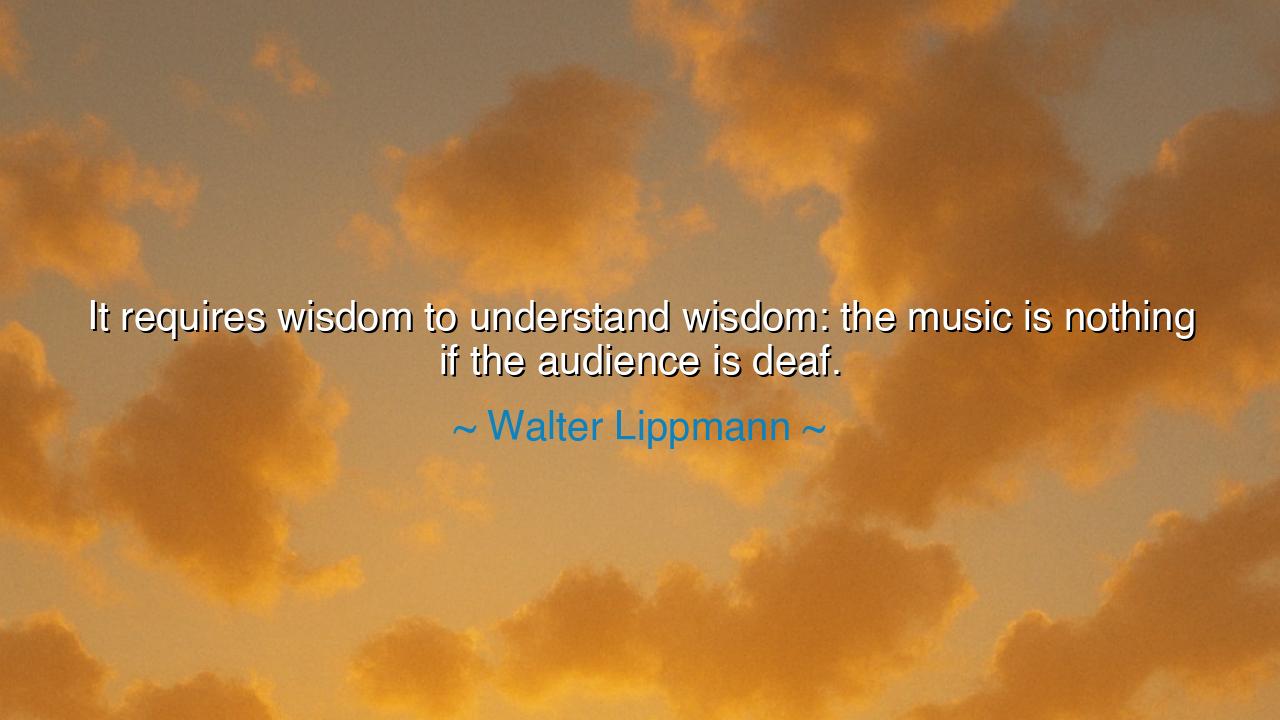
It requires wisdom to understand wisdom: the music is nothing if






The saying of Walter Lippmann, “It requires wisdom to understand wisdom: the music is nothing if the audience is deaf,” is a jewel of thought that shines across the ages. Its essence speaks to the nature of perception and understanding: truth may exist, but unless there is a soul ready to hear it, it falls silent, like a song unsung. For wisdom is not simply possessed; it must be received, nurtured, and awakened in another for its true light to shine.
The ancients knew this truth well. Did not Socrates walk among the Athenians, questioning, guiding, and stirring their hearts toward higher thought? Yet many turned away, unable to hear the music he played with his words. His wisdom was vast, but for those unwilling to listen, it was as though he spoke to the air. Here we see the meaning of Lippmann’s words: the melody of truth is useless to those whose ears are closed, whose hearts are unprepared to receive it.
Consider also the tale of Cassandra in Greek myth. She was gifted with wisdom, the power of prophecy, yet cursed that none would believe her. She foresaw the fall of Troy, but her warnings were mocked. The people were deaf to her song, though it was urgent and filled with truth. This story echoes Lippmann’s insight—what value has the music of wisdom when the audience is deaf, when the mind refuses to hear what is most needful?
History offers us many such lessons. Recall Abraham Lincoln in the days before the Civil War. He spoke of unity, of freedom, of the dignity of man, but to many his voice was strange and unwanted. In the South, his words fell on deaf ears, and even in the North there were many who mocked him as a fool. Yet for those who opened their hearts, his wisdom became the music of liberation, leading to the abolition of slavery and the rebirth of a nation. His message did not change, but the readiness of the listener determined whether it was dismissed or embraced.
The teaching is clear: one must cultivate not only the voice that speaks truth but also the ear that hears it. To understand wisdom requires a stillness of spirit, a humility of heart, and a willingness to listen beyond one’s prejudices. Without such qualities, even the grandest teachings will pass unnoticed, like a harp playing in the desert winds. To be truly wise is not only to hold knowledge but to recognize wisdom when it is spoken by another.
For you, dear reader, the lesson is this: do not become deaf to the music of truth. When words of counsel, correction, or insight reach you, pause and listen with the ear of your soul. Ask not only whether the sound is pleasing, but whether the heart of the message carries light for your path. Many stumble through life not because wisdom is absent, but because they cannot—or will not—hear it.
Practically, you may train yourself to become receptive. Seek conversation with those who are older, wiser, or who have walked paths different from your own. Read deeply, not merely to confirm your own thoughts, but to challenge them. Listen when others speak, even if their song is strange or uncomfortable. For it may be that in their words lies the wisdom you need most.
Thus, let Lippmann’s words ring like a timeless bell: Wisdom alone is not enough. The heart must be ready, the ear must be open. Only then does the music of truth find its power, and only then does humanity rise toward its greater destiny.






AAdministratorAdministrator
Welcome, honored guests. Please leave a comment, we will respond soon